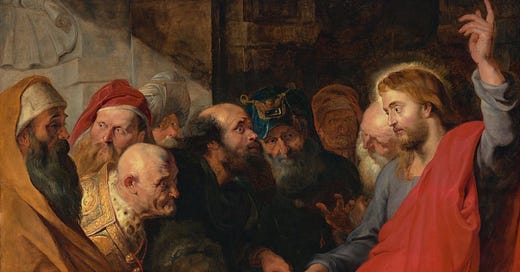Tuesday of Holy Week—Tenants of the Temple
On Monday of Holy Week, when Jesus overturned the tables in the Temple, he didn’t just disrupt a few merchants—he brought the entire Temple economy to a standstill. The Temple authorities, determined to discredit him and restore business as usual—an economic system that oppressed the poor and marginalized—set their sights on silencing him. To this end, when Jesus returns to the Temple on Tuesday, the Pharisees and Herodians, (usually opposed Temple factions) approach him with several trick questions about his authority, paying taxes, marriage and death—all of which are designed to trap him and turn the crowd against him. We are told the chief priests were “afraid of the crowd.” In response to these attacks, Jesus tells a parable of tenants in a vineyard—a oft-used metaphor for Israel itself. (Isaiah 5:1-7). In the story, the tenants refuse to share the vineyard’s harvest with its rightful owner, abusing and killing those sent to collect it. Finally, the owner sends his son, whom they murder in a bid to claim the vineyard for themselves. When the chief priests and scribes hear this story they understand clearly who it is aimed at - them.
The allegory of the story is pretty straightforward. The vineyard (Temple), under the care and control of the tenants (Temple authorities) has been fruitless (unjust) in the name of the owner (God). Taking a close look at the allegory of Jesus story is revealing on several levels. Firstly, and most obvious, is that Jesus’ story is a clear indictment of the greed a the heart of the current authorities. Secondly, The parable’s prophets—those sent by the owner to share in the vineyard’s harvest—are met with violence. The Hebrew prophets, who consistently called for justice, were treated the same way by those in power. Amos, who proclaimed, ‘Let justice roll down like waters,’ was tortured and killed by the priests. Micah, who preached, ‘Do justice, love kindness,’ was slain by the son of King Ahab. Isaiah, who insisted, ‘Seek justice, rescue the oppressed, defend the orphan, plead for the widow,’ was sawn in two by King Manasseh. Time and again, those who demand justice find themselves crushed by those who profit from injustice.
Thirdly, the particular Temple leadership appointed or supported by Roman authorities would have immediately recognized the vineyard in Jesus’ story as the same vineyard described by Isaiah. Isaiah’s song about the unfruitful vineyard ends with its destruction: “I will remove its hedge, and it shall be devoured; I will break down its wall, and it shall be trampled down. I will make it a waste…” (Isaiah 5:5-6). No wonder the authorities wanted to get rid of Jesus. Even as Jesus and his disciples were leaving the Temple that day, he said, “Do you see these great buildings? Not one stone will be left here upon another; all will be thrown down” (Mark 13:2). Yet it is crucial to remember: Jesus’ critique of the Temple was not an indictment of Judaism (remember Jesus himself is Jewish) but rather of specific leaders whose alliance with Caesar’s power and values would lead to their destruction.
Finally, Jesus parable turns upside down the economic and agricultural realities of ancient Palestine and Jerusalem. The ruling elites of the the Temple were wealthy as for generations they had been consolidating surrounding land through usury and were now the landowners of surrounding farms, orchards, and grazing fields and kept a large percentages of their produce for themselves. This economic system produced the haves and the have-nots. In Jesus’ parable the Temple authorities are cast not as owners, but as tenants, and corrupt ones at that. Jesus demotes these rich, land-owning Temple authorities to the status of tenant farmers. This was one of the reasons that Jesus’ rhetorical brilliance was so popular with the impoverished masses and so revolutionary. This reversal surely was an embarrassment for those used to privileged status and a narrative example of what the Song of Mary means when it describes “He has brought down the powerful from their thrones, and lifted up the lowly.” (Luke 1:52) The Temple authorities weren’t just unimpressed, they were furious.
Jesus confronts the commercial special interests in the Temple yesterday by turning the tables. Today he goes head to head, nose to nose with the Temple authorities, economic leaders, priests, scribes and any who would challenge him. He has condemned their greed as being fruitless and unconcerned with justice, and he has done it all on the their turf. By the end of the day, after many challenges, Mark writes “no one dared to ask him any more questions.” Those who defended economic exploitation and social oppression in the name of God had been exposed. Jesus beats them at their own game. Now they’ll change the rules; time to start playing dirty.




